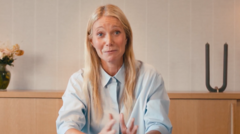A recent investigation reveals how influencers exploit the vulnerability of women with polycystic ovary syndrome (PCOS) by promoting unverified supplements and false cures.
**The Rise of Influencer Misinformation: Fake PCOS Cures Exploiting Vulnerable Women**

**The Rise of Influencer Misinformation: Fake PCOS Cures Exploiting Vulnerable Women**
Influencers are promoting unproven PCOS remedies, misleading many women suffering from the condition.
In the realm of social media, where millions seek health solutions, a disturbing trend is emerging—unqualified influencers marketing fake cures for polycystic ovary syndrome (PCOS). Among these influencers is Kourtney Simmang, who has gained attention for her promises to "cure" PCOS despite the lack of a known definitive treatment. Women like Sophie, who endured debilitating symptoms including painful periods and weight gain, have fallen prey to Simmang's methods, paying upwards of $3,600 for questionable tests and supplement regimens that ultimately offered no relief.
Dr. Jen Gunter, a renowned gynecologist, speaks out against such practices, highlighting that Simmang lacks the credentials to offer these medical tests and pointing out the limited clinical application of her products. Regrettably, after a year of following Kourtney’s so-called treatment, Sophie reported a deteriorating relationship with her body, stating, “I didn’t have the capacity to improve my PCOS.”
The situation is exacerbated as many influencers, boasting millions of followers, capitalize on the absence of effective medical solutions for PCOS by marketing themselves as 'experts' in women's health. The BBC World Service's analysis of "PCOS" videos on platforms like TikTok and Instagram revealed that half of the most popular content contained misleading information, further complicating the landscape for women desperately seeking help.
According to the World Health Organization (WHO), up to 70% of women with PCOS remain undiagnosed, and even those with a diagnosis often struggle to find effective treatments. Dr. Gunter warns that in the void created by insufficient medical options, individuals with questionable expertise often promote false claims, such as the idea that dietary supplements or specific diets can fully resolve PCOS.
Furthermore, many influencers, such as the registered dietitian Tallene Hacatoryan, emphasize restrictive diets and their supplement product lines, often discouraging traditional medical interventions like birth control pills, which have been proven beneficial for many women. Amy from Northern Ireland is one of many who has tried following Hacatoryan's advice, only to face adverse effects from rigorous diets that left her feeling worse.
The consequences of such misinformation can be profound, contributing to eating disorders and delaying much-needed medical care. Some women, like Medlyn from Nigeria, are now advocating for a return to evidence-based treatments, aiming to combat the stigma associated with PCOS and educating others about their condition.
In conclusion, as influencers continue to proliferate misleading health advice, women battling PCOS need support from qualified professionals who can guide them through their journey with correct information and viable treatment options. Without access to correct medical support, women may face not only immediate health issues but also long-term repercussions from misleading health narratives presented on social media.
Dr. Jen Gunter, a renowned gynecologist, speaks out against such practices, highlighting that Simmang lacks the credentials to offer these medical tests and pointing out the limited clinical application of her products. Regrettably, after a year of following Kourtney’s so-called treatment, Sophie reported a deteriorating relationship with her body, stating, “I didn’t have the capacity to improve my PCOS.”
The situation is exacerbated as many influencers, boasting millions of followers, capitalize on the absence of effective medical solutions for PCOS by marketing themselves as 'experts' in women's health. The BBC World Service's analysis of "PCOS" videos on platforms like TikTok and Instagram revealed that half of the most popular content contained misleading information, further complicating the landscape for women desperately seeking help.
According to the World Health Organization (WHO), up to 70% of women with PCOS remain undiagnosed, and even those with a diagnosis often struggle to find effective treatments. Dr. Gunter warns that in the void created by insufficient medical options, individuals with questionable expertise often promote false claims, such as the idea that dietary supplements or specific diets can fully resolve PCOS.
Furthermore, many influencers, such as the registered dietitian Tallene Hacatoryan, emphasize restrictive diets and their supplement product lines, often discouraging traditional medical interventions like birth control pills, which have been proven beneficial for many women. Amy from Northern Ireland is one of many who has tried following Hacatoryan's advice, only to face adverse effects from rigorous diets that left her feeling worse.
The consequences of such misinformation can be profound, contributing to eating disorders and delaying much-needed medical care. Some women, like Medlyn from Nigeria, are now advocating for a return to evidence-based treatments, aiming to combat the stigma associated with PCOS and educating others about their condition.
In conclusion, as influencers continue to proliferate misleading health advice, women battling PCOS need support from qualified professionals who can guide them through their journey with correct information and viable treatment options. Without access to correct medical support, women may face not only immediate health issues but also long-term repercussions from misleading health narratives presented on social media.


















